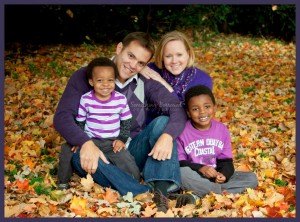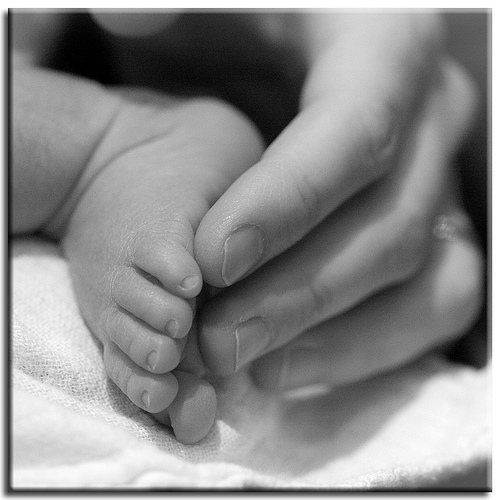Today is Guest Post Swap Day at the Health Activist Writer’s Month Challenge! I am delighted to have been paired with Becky, who looks at the world of adoption from a different vantage point to me. I am an adoptee, and Becky is the mom of adoptees. In her blog, Lessons from an Infertile Social Worker, she writes about her journey to motherhood and her life as a parent. Today, she shares an aspect of adoption that really needs to be given some attention.
When I think about adoption, there is so much to say; I find it difficult to narrow down the topic. Do I talk about how we came to the decision that the way our family would grow was through adoption? Do I share my journey to breastfeeding my two sons, both of whom we adopted? Do I discuss open adoption, why we chose it, and the challenges and blessings it has afforded me? Do I educate about proper adoption language? Do I ponder how adoption has changed my parenting philosophies? There are so many possibilities.
In my professional life, I’ve talked with hundreds of pregnant women and new mommies about postpartum depression, the feelings, the red flags, how to recognize it in themselves, how others around them could recognize it and be supportive, what can help, etc… I could assess whether a new mommy was experiencing symptoms, and I could diagnose it. I knew how to talk to her about it, and what resources to point her towards. What I never knew was that it was something I could experience. I’d told women for years that a big part of postpartum depression was their out-of-whack hormones. I knew that I wouldn’t have to deal with that thanks to adoption. I was wrong. I did experience it, even without the hormones to blame.
I can’t imagine any child being more wanted than my son. We tried for years to get pregnant and I was thrilled beyond belief when we were chosen by his birth family. I was thrilled to take him home, to put him in his bed, to cuddle him, to nurse him, to rock him, to read to him… But somewhere along the way things changed. Really, it may be more accurate to say that things didn’t change, at least not how I thought they should and would.
I told moms all the time that “over half of new parents don’t fall head over heels in love with their babies right away. You didn’t experience love at first sight with your partner, so why should you expect it with your baby. It takes a while to get to know one another. It will come in time. Don’t feel guilty if it doesn’t happen immediately, but don’t doubt that it will come”. I never even considered the possibility that I wouldn’t experience that all-consuming love for my baby immediately – I wouldn’t have the hormones going crazy, we were prepared, we were ready, we knew what we were doing, we wanted him so much.
I stayed home with him for about 8-9 weeks after he was born. Though hubby shared nighttime duty with me, I was taking 2 graduate level classes and I was still exhausted. In truth, I was at times a little jealous that hubby got to leave during the day (not to mention got to shower and brush his teeth before 3pm). I was rocking the baby one afternoon – it had been a difficult day for me and the 4 week old – when hubby came in from a great day at work. He leaned over the side of the rocking chair and tenderly said, “I never thought I could love anyone as much as I love you, but I sure love this little guy a lot”. I could see he had tears in his eyes though I couldn’t bring myself to really look at him. Because all that was running through my mind was, “well big deal for you. How wonderful for you to get to feel that way?!!!”. All I said out loud was “yeah”.
I was furious. At the time I thought I was angry with him, but I realize now I was angry with myself. Angry that I didn’t feel that way about our son, the baby I had so longed for, the baby I had waited and prayed about for years. Angry that hubby got to feel that way first. Angry that I hadn’t yet brushed my teeth that day.
But mostly I felt guilt. Guilt that this child deserved all-encompassing love that I wasn’t sure I could give to him. Guilt that I was angry which surely he could sense. Guilt that by not feeling that intense bond and attachment he would be permanently scarred. Guilt that obviously I wasn’t worthy to be a mother, which was maybe why God hadn’t *let* us get pregnant. Guilt. Dark, ugly guilt.
I don’t know when my love for my son became “big”, though I do remember when I realized that it had. When he was about 4 months old, we both had a nasty stomach virus. He vomited in hubby’s mouth (I know, gross, but I warned hubby not to play rough with a baby who had been puking all day) and I thought, “You show him, kid”. I realized we were a duo then, this adorable baby and I, we had something that was just between the two of us, and it was strong and intense. We had that bond. I hadn’t completely failed.
It took me a long time to recognize myself what I was experiencing after my son was born, and quite a bit longer to admit to it to anyone. I’ve now read research and talked with other parents through adoption and I know I’m not the only one to experience post adoption depression. I still carry some guilt about it, but I realize it’s nothing I can change. I also know I have the most awesome son with whom I now have an intensely strong bond. I know he wasn’t harmed by the natural progression of our relationship. I’m trying to forgive myself, which I know is silly because, as I would tell any of the hundreds of mommies I worked with, it wasn’t my fault.
Post adoption depression is real and it is no more a mother’s fault than postpartum depression. It’s not something to be ashamed of and it isn’t a dirty little secret. And, just like postpartum depression, it’s something we need to talk about so that no one else has to feel guilty or alone.












